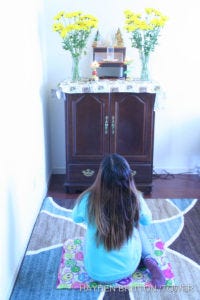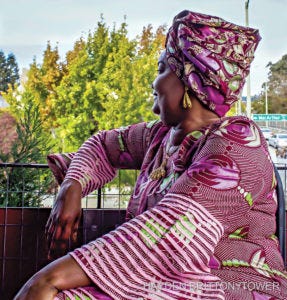ASONTA
For Asonta Abifo, a student at Laney, America is her home now, but half of her is not here. The other half is still back home, in South Sudan, amidst another civil war.
Tears form in Asonta Abifo’s dark eyes but never fall. She smiles occasionally and light laughter follows. At other times she only sighs.
She arrived in Oakland in April 2000 by way of Egypt. She came with her two young daughters, and her husband.
Three weeks prior to their departure, her 7-year old son died from sickle cell anemia. Her husband had recently been released from prison after being wrongly accused by the Sudanese government for suspected involvement with South Sudanese rebel forces. He was also very sick and suffering from headaches.
When they arrived in Oakland, doctors discovered her husband’s headaches were caused by a previously undiagnosed brain cancer. Three weeks later, he passed away.
In less than one month Asonta became a widow, a single mother and a refugee. Alone, she began building a new life for herself and her children.

MAYA
As a young girl in Burma, Maya had many friends. (Maya is a pseudonym, used to protect the privacy of another Laney student with a complex journey.)
Maya giggles, remembering that her friendships made her older sister jealous. But she doesn’t have as many friends here in the United States, and the ones she has, she doesn’t see very often. She is too busy working.
In Maya’s home, a Buddhist altar is displayed in her living room next to a large flat screen television. A small blanket lies on the floor before the alter. This is where she meditates and prays.
Maya left her hometown of Yangon eight years ago, in an attempt to give her young daughter a better life. After living in a refugee camp in Thailand for two years, they were granted asylum in the United States. Her husband was serving a 20-year prison sentence as a political prisoner, and did not accompany them. He is no longer in prison, but after serving time in jail it is unlikely that he can ever gain refugee status.
When Maya first arrived in Oakland, she and her daughter lived with five other Burmese refugee families. Soon after arriving, she found a full-time job in a food-packaging factory making $8 an hour.
She tried to make ends meet for her small family. She worked there for two and half years. In the evenings, she attended adult school to learn English. But when she hurt her ankle while working, she was forced to quit her job.
Maya was faced again with the question of how she would support herself and her daughter.
EYES WIDE OPEN
The IRC (International Rescue Committee) is an organization committed to helping people around the world who are affected by humanitarian disaster.
In the United States in 2015, they helped 9,961 newly arrived refugees get settled in their new communities. They helped thousands of other refugees and asylees prepare for arrival in the United States, and to navigate the immigration process.
They helped both Asonta and Maya through the resettlement process, when they arrived.
“Our clients are extremely resilient,” said Maggie Hicks, the Development Manager of the IRC Northern, California. “They have come from places of great hardship. They arrive with their eyes wide open, with hopes for the future.”
She finds that Asonta and Maya’s stories ring true for many of the refugees she meets.
Regardless of their country of origin, they all struggle with learning the language, finding affordable housing and the challenge of rebuilding their lives. Hicks sees that the community here in Oakland is great at supporting refugees who come.
She said that Laney College and the other Peralta schools have also helped a lot and been places where refugee students feel welcome and comfortable.
Many of the people who are seeking asylum now are highly educated in their home countries. They often have to start all over again when they arrive.
HELD UP BY HOPE
Asonta and Maya are strangers to one another with very different stories. They have struggled since arriving in Oakland with many things, and life is still very difficult for them today. But they share their belief in the American dream. To them, it is a reality. Despite their struggles and the losses they’ve experienced, they believe in this classic notion of America.
“America gave me hope and a better life. They opened the door for me. When I was crying, they wiped my tears,” Asonta said.
Their dream for the future is very simple: to finish their studies and find good jobs, two things that were not available to them in their home countries. Laney College plays a role for them in facilitating those dreams. Neither one spoke any English when they arrived.
Asonta recalls having to walk from Alta Bates Hospital to her home on East 39th Avenue when her husband needed clothes after an operation. She walked the five miles to reach her husband at the hospital because she didn’t know how to ask for a ride or take the bus. Now she is studying Early Childhood Development.
Maya studies Business Accounting and Administration.

“TOMORROW IS GOOD”
When asked about her dream for the future, Maya says she has no time to dream because life is very hard right now. She just wants to find a good job.
She talks about how difficult it is to find any opportunities or jobs in Burma. Women are very dependent on their husbands once they are married. In America she is proud that she can support her family without the help of a man.
“When I came here, I can do whatever I want. I can work, and take care of my daughter. I don’t want to depend on anyone,” Maya said.
Her older sister lives with her; together, they support Maya’s daughter and her sister’s four children. Money is very tight, their rent is constantly rising, but they are free. They have no one to answer to but themselves.
Asonta worries constantly about her family still back home in her village of Wau, South Sudan. They dominate her conversation and thoughts. She says life is difficult because her family is not with her. She says they have no life in South Sudan. They go to sleep and when they wake up, they thank God to be alive. They live day-to-day. She fears that whenever a call comes from back home it is to bring bad news.
Her outlook is explained by where she has come from.
“Today is bad, tomorrow is good. You have to live with it and let it go and realize that is what life is,” Asonta said.
The happiest moment in her life was returning to her village for the first time after moving to the United States, and seeing where she was born and seeing her family. She says happiness now is coming to school and being free. “Even if I have challenges, I am in America. Everybody has freedom.”
REFUGEES IN CRISIS
When asked about the current refugee crisis, Asonta feels strongly that Americans should not close the door on these people. She sees the United States as a country that believes in human rights and helping everyone.
Indeed, she speaks from personal experience.
Maya understands the fear some Americans have about housing people of Muslim faith because her country has similar fears about its own Muslim community.
The United Nations High Commissioner for Refugees Global Trends report found that in 2015, 65.3 million people, or one person in every 113 were displaced from their homes due to persecution or conflict. The number of people seeking asylum, 3.2 million, was the highest in history; 40.8 million people were displaced within their own country, and there were 21.3 million refugees, the highest number since the 1990’s.
At present, most of the world’s refugees come from three countries: Syria, Afghanistan and Somalia.
The report also found that 51 percent of all refugees were children. Of that number, nearly 100,000 child refugees were alone or separated from their families.
These are not just numbers. Each one is a person like Asonta. Each has a story like Maya. Perhaps some of these children will one day also believe in the great American dream.

























